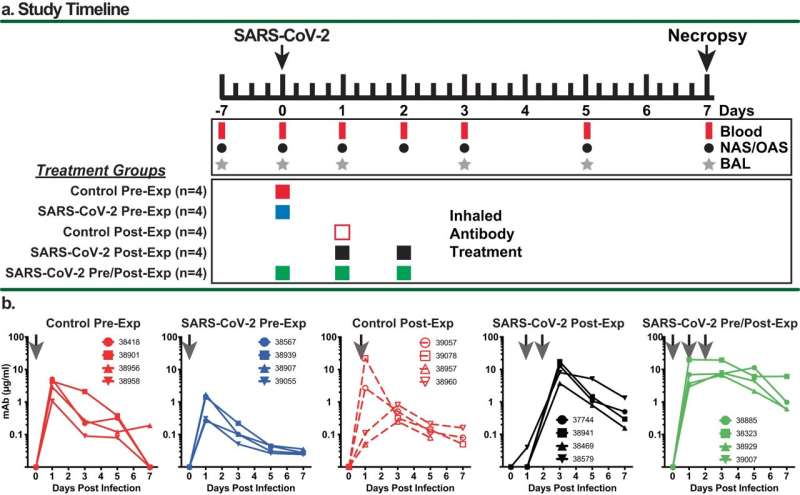This article has been reviewed according to Science X's editorial process and policies. Editors have highlighted the following attributes while ensuring the content's credibility:
fact-checked
peer-reviewed publication
trusted source
proofread
Inhaled monoclonal antibodies found to be protective against COVID-19, show promise for at-home aerosolized therapy

Another at-home treatment option for the flu and other respiratory illnesses is closer to becoming a reality, thanks to new research that found inhaled, monoclonal antibodies against SARS-CoV-2 significantly reduced COVID-19 disease in nonhuman primates.
The study, published in the journal Nature Communications, shows the amount of infectious SARS-CoV-2 in the lungs of rhesus macaques that breathed in aerosolized antibodies was up to 10,000 times less than control animals that were given control antibodies.
"The effect of the inhaled antibodies in our study was striking," said the study's senior author, Nancy Haigwood, Ph.D., a professor at Oregon Health & Science University's Oregon National Primate Research Center. "The aerosolized monoclonal antibodies we evaluated were remarkably effective in protecting against lung damage. This gives me hope that one day we might be able to buy a monoclonal antibody nebulizer at the pharmacy to treat and even prevent respiratory illnesses like the flu."
Monoclonal antibodies can help to clear invading pathogens like viruses before the body's natural immune responses, including antibodies, have time to develop. During much of the global pandemic, monoclonal antibodies were an important treatment option for people with COVID-19. But this treatment has only been available through an intravenous infusion that has to be administered at a hospital or clinic.
Infusion treatments must first travel through the blood stream before arriving at the specific site of a particular infection—primarily the lungs with COVID-19. Such a delay means the treatment isn't able to immediately battle a virus, and an infection can worsen. Inhalable treatments can arrive at the lungs within seconds and get to work more quickly.
Previous research in mice has shown that aerosolized monoclonal antibodies can protect against SARS-CoV-2, but this marks the first time the therapy has been tested with live virus in nonhuman primates.
For this study, the multidisciplinary research team collaborated with several groups to identify and procure human monoclonal antibodies that target different parts of the spike protein on the delta variant of SARS-CoV-2, which was a dominant COVID-19 strain at that time. They worked with Aridis Pharmaceuticals and Zalgen Labs to produce the monoclonal antibodies.
To deliver those antibodies, they used a nebulizer—which mixes liquid medication with air to create a fine mist—from medical device manufacturer PARI that is designed to create droplets that can reach the lower lungs.
The research team found the amount of SARS-CoV-2 RNA in the lungs and nasal swabs was quickly reduced 1,000-fold in nonhuman primates that received aerosolized SARS-CoV-2 monoclonal antibodies either before being exposed to the delta strain of the virus or both before and after viral exposure.
Infectious virus was significantly lower than control animals that received an aerosolized human monoclonal directed to respiratory syncytial virus, or RSV. However, when animals only received the aerosol therapy after being exposed, the benefit was less pronounced.
Led by the study's first author, Daniel Streblow, Ph.D., professor at the OHSU Vaccine & Gene Therapy Institute, and co-senior author Donald Forthal, M.D., of the University of California at Irvine, the study collaborators plan to determine if they can further improve the delivery of aerosolized monoclonal antibodies to nonhuman primates.
More information: Daniel N. Streblow et al, Aerosol delivery of SARS-CoV-2 human monoclonal antibodies in macaques limits viral replication and lung pathology, Nature Communications (2023). DOI: 10.1038/s41467-023-42440-x


















